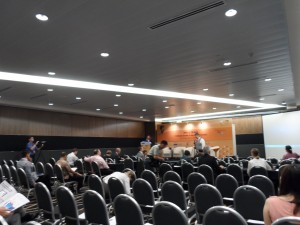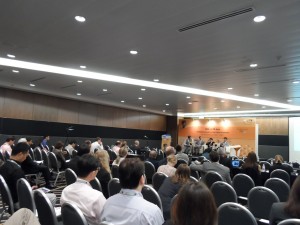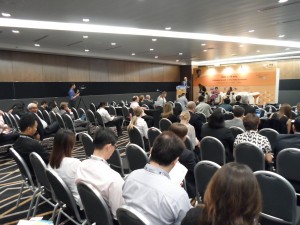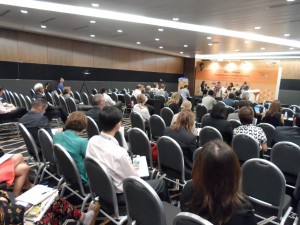
31 Oct, 2013
PATA CEO Fudges Role as Panel Moderator at ITB Asia
Singapore, 24 Oct 2013 – For those who have seen PATA at its peak, to see it playing a distant second-fiddle on the ITB Asia media events programme was a sorry experience. Even more grim was to see its ongoing struggle for relevance as it tried, vainly, to honour the promise to offer “valuable new insights” on the topics of human resources and inbound/outbound travel trends. PATA CEO Mr. Martin Craigs’ playing moderator was of little help. Unable to ask incisive questions or raise key issues, his effusive flattery of the speakers and their organisations neither enhanced the value of the event nor met the expectations of time-pressed participants.
The session was divided into two one-hour panel discussions on “Human Capital Development: Opportunities and Obstacles” and “Profitable Growth in Visitor Economy: Examples of Growth and Opportunities”. Mr. Craigs moderated the first; the second was run by PATA regional director Ivy Chee. As the accompanying pictures show, participation averaged about 40-50%, much better than the anemic turnout at some of the other events but much lower than the standing-room-only turnout at the NATAS event.
 |
| Attendance at the PATA session at ITB Asia, 24 Oct 2013. Picture taken at the start of the first panel discussion. |
 |
| Towards the end of the first session |
 |
| At the start of the second session |
 |
| Towards the end of the second session. |
Mr. Craigs introduced the sessions by saying that such forums “can only be successful if there is a genuine dialogue, not a monologue.” He then launched a 10-minute spiel on PATA programmes and activities. Following that, he talked about the need to earn respect for travel & tourism at the highest levels of government.
Expressing alarm that tourism still gets treated like a second-class citizen, he said PATA’s role is to make sure that the industry as a whole is recognised for the benefits it delivers. Unlike the banking, finance and automobile industries which have seen bailouts over the last few years, “we’ve never asked for any money.” He said PATA was now trying to deliver “aligned advocacy, insightful research and innovative events,” via face-to-face meetings. “We are not going to surrender to a world of cold, glass screens. And that’s a reminder for the NextGen: they need to get a next-life life, not a just a cold-glass life.”
Turning to human capital development, he said there would simply not be enough qualified manpower to meet demand in view of the predicted growth in visitor arrivals. The aviation sector, for example, will need to train pilots as well as the entire supporting corps of engineers, etc. He said PATA is striving to integrate the tourism value chain across the industry, in line with its new “complete visitor economy” philosophy, a slogan which was discussed for four days at head office. He said PATA is keen to get the industry out of its silo mentality. “It is not just about hotels, airlines and NTOs being successful but (assessing) the whole impact of the industry. And of course, the search for balance is indeed a challenge that we need to face up to, as stated by Imtiaz (Muqbil, Executive Editor of Travel Impact Newswire) so eloquently over the years.”
In a show of refreshing honesty, he concluded his opening remarks by declaring himself to be a “specialist generalist, which means that I do not know too much about anything.”
Andrew Chan, CEO, ACI HR Solutions, called the upcoming manpower crunch the “single greatest challenge facing the industry today”. Although 67% of all new jobs created globally will be in Asia by 2020, the “war for talent” will get worse as the working age population across Asia contracts. Ageing societies in China, Singapore, Thailand, South Korea, Indonesia and many other parts of Asia means that more people are leaving the work force than entering. There are not enough Gen Y’s entering work force to replace retiring baby boomers.
In China alone, about 400,000 staff would be required to support the number of hotel rooms in the pipeline over the next few years. That will mean rising salaries and a ripple-effect impact on corporate bottom lines, he said. The old paradigm, “Pay Your Dues, Work Hard And Then You Will Be Rewarded” is being replaced by the new one, “Reward Me Now And I Will Work Hard.”
Mr. Yap Chin Siang, Assistant Chief Executive of Policy & Planning Group, Singapore Tourism Board said growth is expected to moderate, largely due constraints in Singapore’s labour force, which is in addition to existing limits on the island nation’s physical geography and natural resources. The question for the travel & tourism industry is how to redesign jobs, work flows and business processes in order to attract new talent and optimise the limited manpower. “We have done well so far but cannot rest on our laurels and be complacent.”
Mr. Yap said the tourism industry had to shift gears to a yield-driven quality approach, and prioritise growth in spending over growth in arrivals. The STB is working closely with private industry to establish schemes to attract the right kind of talent in sufficient numbers, and build the supporting capabilities.
This comment brought the discussion around to the industry’s long-standing and well-known challenge: How to attract and retain talent.
Mr. Chan said that it is not all about money. Young people want work that will fit into their lifestyles, and a role that offers them flexibility, fun and the ability to learn. “Today’s talent gets bored very, very quickly. Employers don’t recognise that. They leave them in their role and forget about them and don’t give them an opportunity to develop in their career paths.” He said young people change jobs like their iPhones and iPods. They finish a game and move on to the next one. It’s no different with jobs.
James Mabey, Senior VP Development Asia Pacific of the Jumeirah group, said industry salaries are low and the lifestyle is not competitive, such as having to work over long weekends and festive seasons. “Nobody wants to work when everybody else is having fun,” he said.
After the presentations, Mr. Craigs put in another plug for PATA and its new action-oriented NextGen agenda. He said PATA has opened a new Academy at its Bangkok HQ and will be running its first course this December “for rising-star managers who want a 360 degree view of what is going on in the industry.” Practitioners, not academics, will be brought in to provide “a short, sharp uplifting experience.” Not that PATA has anything against academics, but “the industry tells us it wants to learn more from practitioners.” The Academy does not intend to compete with any of the numerous educational institutions across Asia, he said.
The presentations and Q&A reviewed the challenges facing the manpower sector, but yielded few, if any, of the “valuable new insights” promised in the publicity. Asked what he thought of the session, Singapore travel agent Allen Tsang shrugged, “Talk is cheap.” Several key issues were missed entirely. What will be the impact of the ASEAN Economic Community? What incentives can governments provide to help upgrade training and education institutions? What can be done to improve the poor working conditions of migrant labour? With adequate homework, an incisive moderator, such as the newscaster who ran the action-packed NATAS session, would have picked up on these points.
Mr. Craigs spent much time promoting PATA, lauding speakers’ qualifications and praising their organisations/companies. The flattery directed at Mr. Yap and the STB (even Singapore’s F1 was cited) appeared to be designed to bolster the case for the STB to rejoin PATA. Between all that, Mr. Craigs also took time to recognise PATA stalwarts Kevin Murphy and Alwin Zecha who attended the first session briefly.
In introducing the next session, he hailed Ms Ivy Chee’s grasp of four Asian languages, and then mispronounced the name of the star panelist, Daw Kyi Kyi Aye, Senior Tourism Advisor at the Myanmar Tourism Federation, as “Ki Ki”. Basic homework would have made it known that “Kyi” is pronounced “Chee”. For someone who has lived in Asia for so long and heads the region’s pre-eminent travel body, such lapses are inexcusable. They also raise questions about Mr. Craigs’ leadership and ability to deliver on the agenda of “aligned advocacy, insightful research and innovative events” within the context of a rising Asian Century.
With his salary funded partly by the region’s tax-payers through their respective NTOs, Mr. Craigs is known to be desirous of a three-year extension as CEO. As this editor has pointed out previously, his strengths and weaknesses now are more than apparent. He waged an intense and high-profile battle over the UK Air Passenger Duty, and lost. Although his primary forte is salesmanship – he has won two “awards” recognising this — his public appearances are showing up awkward deficiencies. He hails the fact that PATA now has a “seat at the table” alongside other high-profile global travel & tourism organisations. If that seat is to yield anything substantive, he will have to either fix these deficiencies, or find someone who can.



Liked this article? Share it!